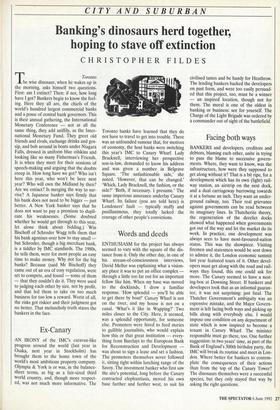Words and deeds
ENTHUSIASM for the project has always seemed to vary with the square of the dis- tance from it. Only the other day, in one of his stream-of-consciousness interviews, David Mellor was explaining what a vision- ary place it was to put an office complex through a little too far out for an important fellow like him. When my base was moved to the docklands, I drew a familiar response. 'How splendid — you'll be able to get there by boat!' Canary Wharf is not on the river, and my house is not on a canal. 'What's it like in Wapping?' Two miles closer to the City. Here, it seemed, was a splendid opportunity, for someone else. Promoters were hired to feed stories to gullible journalists, who would explain how this or that great institution — every- thing from Barclays to the European Bank for Reconstruction and Development was about to sign a lease and set a fashion. The promoters themselves never followed it, sitting tight within lunching range of the Savoy. The investment banker who first saw the site's potential, long before the Canary contracted elephantiasis, moved his own base further and further west, to suit his civilised tastes and be handy for Heathrow. The lending bankers backed the developers on past form, and were too easily persuad- ed that this project, too, must be a winner — an inspired location, though not for them. The moral is one of the oldest in banking or business: see for yourself. The Charge of the Light Brigade was ordered by a commander out of sight of the battlefield.


































































 Previous page
Previous page